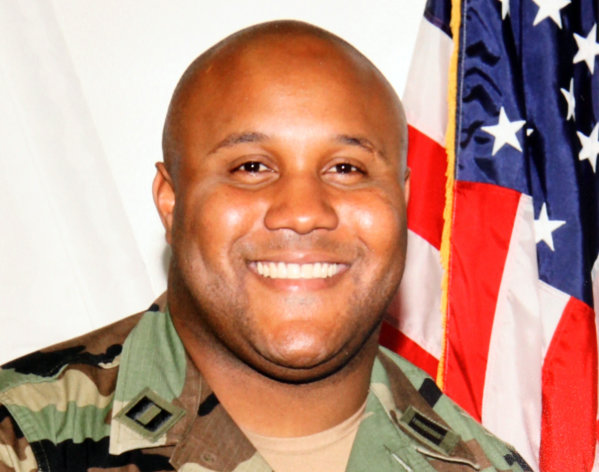 ORANGE, Calif. (AP) — A photo never tells the whole story, and that's especially true for Christopher Dorner. The images on his Facebook page are essentially the same: Dorner, smiling, seemingly loving life and all it offers.
ORANGE, Calif. (AP) — A photo never tells the whole story, and that's especially true for Christopher Dorner. The images on his Facebook page are essentially the same: Dorner, smiling, seemingly loving life and all it offers.
But they accompany a rambling document where he portrays himself as a real-life Rambo, an expert in weapons, explosives and military tactics who will stop at nothing to avenge his 2008 firing from the Los Angeles Police Department.
It's incongruous and it underscores the complexity of the man who now is the most wanted in America, accused of killing three people as he carries out his vendetta.
Where Dorner sees himself as a warrior, others see someone much different. The 6-foot, 270-pounder is a physical hulk who — despite his size — seemed to battle deep-seated insecurities, lived with his mother and cracked under the pressures of police work.
Court and police files show that Dorner once began weeping while on duty in a patrol car, awkwardly flashed his police badge on a first date and told a girlfriend he kept his emotions bottled up.
Those who study the psyches of criminals said Dorner's aggressive and self-aggrandizing rant indicates a classic case of malignant narcissist personality disorder. Some people with the disorder are extremely thin-skinned and vengeful, said Mary Ellen O'Toole, a retired FBI profiler.
They may seem insecure, she said, but in reality their rages — and even tears — are extreme reactions to real or imagined criticisms because they have such grandiose visions of themselves.
"He's putting in his manifesto that he's going to use all the training he received as an LAPD officer and as a military officer to basically hold Southern California hostage, and to be there when you least expect it," she said. "Is he deadly? Yes. Of course he has killed people."
"But is he capable of taking on some 1,000 officers looking for him? That's someone with a personality disorder," she said.
Dorner, 33, is accused of killing a woman last weekend whose father had represented him as he fought to keep his police job, and the woman's fiance. On Thursday, police say he ambushed two officers, killing one, and then vanished, setting off a manhunt that put police on alert across the Southwest.
The search Friday focused on the mountains around Big Bear Lake, about 80 miles east of Los Angeles. Police said officers still were guarding more than 40 people mentioned as targets in the rant.
The rambling manifesto was on a Facebook page that also includes smiling pictures of Dorner and critiques or politicians, musicians, and comedians. He also offers commentary on topics from gun control — he wants stricter laws for assault weapons — to sexual abuse by priests to the proper room temperature.
Court papers from 2006 show that Dorner requested a restraining order against a woman he had dated for six weeks after he said she posted his LAPD badge number and trash-talked about him on a website called dontdatehimgirl.com.
Dorner attached the lengthy posting he said was by his ex-girlfriend, Ariana Williams, as well as a handwritten note she apparently placed on his belongings when she returned them after they broke up.
In the web posting, Dorner is described as "severely emotionally and mentally disturbed," ''twisted" and "super paranoid." It also said he flashed his police badge on their first date, lives with his mother and hates himself for being black — at one point asking her to act more like a white woman.
"Just be careful because this guy is a police officer and he will probably think that he can get away with anything. ... If you value your sanity, stay away from this guy."
Dorner claimed Williams was harassing him and sent a threatening letter to his home. He asked that she also stay away from his mother and sister. In her response, Williams denied Dorner's allegations.
Records show Dorner did not show up at a hearing in November 2006 and the case was terminated. She could not be reached to comment. Her attorney, Stephen G. Rodriguez, did not return a call or email seeking comment.
In 2008, after Dorner was deployed to Bahrain with the Navy Reserves, he returned to the LAPD and began to patrol with his training officer, Sgt. Teresa Evans. He had worked for just four months after his graduation from the academy before being sent overseas.
In internal police papers, Evans said Dorner repeatedly asked why he was being put back on patrol without reintegration training. On one occasion, he began weeping in the patrol car and demanded to be taken back to the police academy to be retrained, according to a summary of an interview with Evans contained in 2009 court documents.
Evans warned Dorner that she would give him an unsatisfactory rating and request that he be removed from the field unless he improved. A day after she followed up on her threat with a poor review, Dorner reported to internal affairs that Evans had kicked a severely mentally ill man in the chest and left cheek during an arrest.
A police review panel ultimately found the allegation untrue and Dorner was fired for making a false statement.
In the manifesto, Dorner said the LAPD destroyed his life, ruined his relationships with his mother and sister and harmed his military career.
Those types of statements don't surprise O'Toole, the former FBI profiler, who said narcissists feel intense shame and humiliation when outside events challenge their perception of themselves.
"He's somebody I call an injustice collector," she said. "When they respond to an injustice that they think is out there, their reaction is completely over the top." LINK


